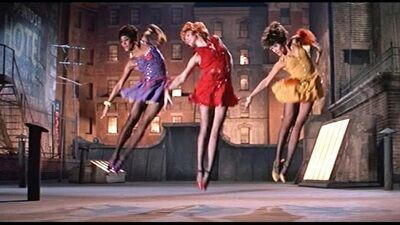Musical professionals often speak of the rare “triple threat,” the performers who are supremely talented as singers, dancers, and actors. But there are just a handful who are genuine quadruple threats, who make the singing, dancing, and acting organic, each element perfectly integrated to tell the story. Listen to her on the original Broadway cast recording of West Side Story, in the role that would win two actresses Oscars for the movie versions. Her “A boy like that” is heart-rending, as much for the acting as singing. Every note is perfect, every lyric distinct, the emotion of the moment translated into music. It was the same with her dancing. Superb technique and unquenchable stamina, with every part of her, every molecule of her body, every movement perfectly executed but also perfectly in service to character and story.
Chita Rivera was born Dolores Conchita Figueroa del Rivero Anderson, in Washington, D.C., the daughter of a Puerto Rican father and a mother of Scottish, Irish, and African-American heritage. She was so energetic as a child that after she broke a table in her home her mother signed her up for dance lessons, telling her, “I’m putting you in ballet class so that we can rein in some of that energy.” Just a few years later, she was spotted by George Balanchine, who brought her to New York to complete her training in classical ballet. But when she accompanied a friend to an audition for an Irving Berlin Broadway musical, Call Me Madam, she was the one who was cast. When she tried out to understudy Gwen Verdun, the leading lady called her to her dressing room to tell her she needed to play leads. Verdun was her great mentor and role model, and it was one of her greatest thrills to star with her in Chicago. She appeared in at least one major Broadway musical every decade for the next 70 years.
In an interview with Eddie Shapiro for his book about Broadway stars, Nothing Like a Dame, Ms. Rivera credited Jerome Robbins with teaching her to act, asking her to think of Anita in colors and textures, and his assistant, Jerry Friedman, for telling her to think of her own brother when she sang about the death of Bernardo. She described standing in the wings, watching Elaine Stritch, Gwen Verdun, and others, and said she was constantly observing everyone around her to keep learning as much as she could.

